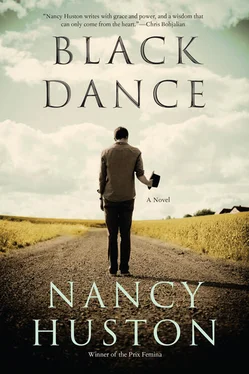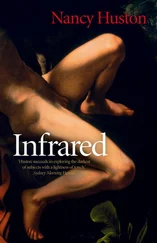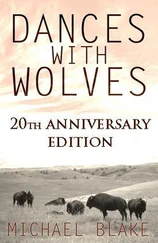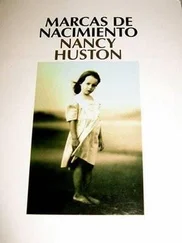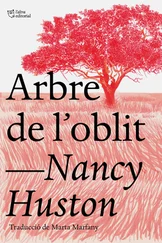“But they both say To Neil Kerrigan , not To Neil Noirlac .”
“Wha? Oh. Yes, well, you see, I changed names when I came over to Quebec.”
“You mean took your wife’s name?”
“No, no, she took mine, only it was. . a pseudonym, if you like. That means a false name. Writers often prefer to publish their books under a pen name, you see. . just as Oscar Wilde did.”
“And your children all took your false name?”
“Yes.”
“So my name is false, too? I should really be Milo Kerrigan?”
“Oh, no, don’t worry about that, Milo. By the third generation it becomes true. Now, listen, I have something important to tell you. . I’ve already made arrangements. . When I die, everything in this library will go to you. . But that, too, is our secret for the time being, yes?”
CUT to the living room downstairs. A Saturday afternoon in February. Fire in the fireplace, slow snow falling outdoors.
Now sixteen and fifteen, Jean-Joseph and François-Joseph are sprawled flat on the living room rug. Spectacular battles between cowboys and Indians unfold before their eyes in black and white, accompanied by bombastic music. The two boys gorge on fried potato peels, guzzle home-brewed beer, belch loudly. Every few minutes, testing the decibel potential of their newly matured male vocal cords, they roar with laughter. In the laundry room across the hall, Marie-Thérèse sighs in exasperation as she feeds clothes from the washer through the mangle.
CUT to Milo, who is hunting in the woods with his uncle Régis. He shoots a rabbit and the two of them rush up to it. The animal is large. Blood gushes from its nostrils into the white snow. Not wounded, dead on the spot. Milo’s bullet entered the brain just above the eye, leaving the body perfect and intact. Régis is proud of him.
“How come Grandad never comes hunting with us?” Milo asks his uncle as they head back to the house.
“Hah! The day Neil Noirlac starts hunting. .”
“But he told me he hunted moose, lynx and rabbit.”
“Oh, is that all?” Régis laughs. “Your grandpa tracks a different kind of prey.”
“But he told me he had a gun!”
“I’ve never seen it, but yeah, I’ve heard tell he’s got one. Brought it over from Ireland with him. A German revolver from the First World War, for the luva God!”
“Maybe he hunts at night?” Milo ventures hopefully.
“Right. And he eats the moose he kills at night, too, so he won’t have to share them.”
They bundle into the shed next to the house. As Milo looks on, Régis skins and guts the rabbit, using a sharp knife with consummate skill to make incisions, peel back the fur, slit open the stomach. Then he cups out the animal’s innards with his bare hands.
“Next time around, you skin what you kill. Okay?”
“Okay, okay.”
CUT.
When grace has been said, Marie-Thérèse lifts the lid of the pot: “Know who shot this rabbit? Milo did!”
“Smells heavenly,” says Neil.
“What?” says Marie-Thérèse. “Only God is heavenly, Papa. Stop your blasphemy. . And stop teaching Milo to blaspheme, you’re setting a bad example! You filled my brothers’ heads full of atheist writers, and look how they turned out: the only thing they’re good at is shoveling clouds. Do you hear me, Milo? Literature isn’t a job, it’s hot air. A lot of hot air, that’s what it is!”
“Can we eat the goddamn stew?” says Régis.
CUT.
Scenes from Milo’s nightmares. Lights glare, telephones ring, shrill voices vituperate. . Cars come to a halt in a screech of brakes. . Ta, ta-da DA, ta, ta-da DA. . Car doors slam. . Milo, in an enormous train station, is grabbed, shoved, handled, dragged, manipulated by strange hands. . His head bangs into the legs of strangers. . a forest of legs. . Several superimposed speeds and rhythms of footsteps — heavy boots, ladies’ high heels, men’s city shoes. . Trains bang and clang, their steam hissing fiercely. . Telephones ring with insistence. . then leap off the wall and come to clobber him over the head all by themselves. . Ambulance and police sirens wail. . Ta, ta-da DA, ta, ta-da DA. . Doors slam. . Women’s voices natter. . Bright lights come closer and closer. . WHITEOUT.
Sitting bolt upright, Milo chokes back a cry of fear.
“That goddamn Milo can’t let us get a good night’s sleep,” François-Joseph grumbles in his half-sleep. “Shut up, you little flea! Shut up! Will you shut the fuck up, for Christ’s sake?”
Heaving himself out of bed, Jean-Joseph lurches across the room and swats Milo on the side of the head. To scare him, he clamps both huge thumbs on Milo’s gullet and makes as if to throttle him.
“Will you shut your goddamn trap?” he says, speaking in an enraged whisper so as not to wake the rest of the household. “It’s not enough we gotta hear about your good marks at school from dawn to dusk, no, you gotta ruin our nights, too, with your stupid squealing. You’re ten years old, for Chrissake! You’re not a baby anymore! If you don’t feel like sleeping, least you can do is piss off and leave us in peace, you little prick!”
Milo’s pulse flutters madly under Jean-Joseph’s thumbs. His arms and legs flail.
“Little prick thinks he’s better’n the rest of us,” mumbles François-Joseph, still in bed. “His mom’s a fuckin’ slut and he thinks he’s better’n the rest of us!”
Turning toward the wall he releases a long, loud fart. Jean-Joseph laughs. Releases the flailing boy and staggers back to his own bed.
“Your slut of a mother shoulda strangled you at birth. Woulda been good riddance, frankly.”
During breakfast, the phone rings and Milo jumps out of his skin. His cousins point at him and guffaw.
As Milo milks a cow in the barn, eyes closed, cheek dreamily pressed up against the animal’s flat brown flank, François-Joseph and Jean-Joseph sneak up behind him and set off an alarm clock— Drring! Drring! — then go into stitches when, leaping to his feet, stiff with fear, Milo upsets the milk pail.
Close-up on the frothy warm white milk, flowing all over Milo’s shoes.
Milo in bed at night, eyes on ceiling, afraid to go to sleep. Close-up on his face as he hears François-Joseph pad across the room and crawl into Jean-Joseph’s bed. . A series of rough, muffled sounds coming from that bed. . He sticks his fingers in his ears until it’s over. . but now he’s unbearably wide-awake. When the brothers start snoring again he rises, slips out into the hallway and tiptoes downstairs. In the living room, before turning on the TV set, he makes sure the sound button is turned all the way down. We watch him watching a 1930s movie— Hôtel du Nord , say, starring Louis Jouvet — with the sound off. His lips move. Approching, we realize he’s inventing dialogue for the film. .
(That’s when your vocation was born, my darling. I owe a great deal to your horrible cousins and your abominable aunt. Had they not tormented you, you’d never have become a screenwriter and I’d never have met you. Paul Schwarz’s life without Milo Noirlac — inconceivable!. .)
In his class at school, a girl starts smiling at Milo and casting him sidelong glances. Though only twelve, she already has generous bosoms and knows how to flaunt them, purposely making them bounce when she walks. At recess, she finds a way of slipping Milo a snapshot of herself. Turning it over, he reads: Je t’aime beaucoup! Edith . He looks up and flashes her the loveliest of grins. (You never had to pursue women, Milo, they always pursued you. That, too, must have contributed to your rare gift for inertia. .)
Now a double series of scenes in rapid alternation. No dialogue, only music; maybe early Beatles songs. . We’re in 1964.
Читать дальше
